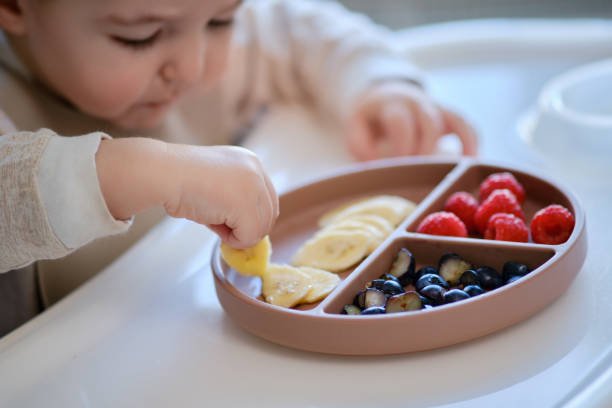Essential Nutrient-Rich Foods for Your Baby’s Healthy Start
Babies are a great blessing of God. The first six months are important for their development and growth. In this blog, we will show why baby food should be started with a nutrient-rich diet, making the foundation for better growth, brain development, and immunity. We will guide parents in identifying healthy and nutritional foods for babies by deriving inspiration from Advanced Medical Science.
Why Healthy Nutrition is Essential in Early Childhood:
- The Essentiality of First Foods: As soon as babies start eating solids, they need nutrient-dense foods. The first foods are a source of essential nutrients and energy to develop the muscles, bones, and brain.
- Long-Lasting Fitness Advantages: Appropriate sustenance in infancy affect’s Baby’s immunity, metabolism, and food preferences in the future, particularly minimizing chances of chronic diseases like diabetes and obesity. Thus we can understand how nutrition in the early days results in long lasting fitness benefits.
Nutrition Rich Food for Babies:
- Iron Rich Cereals: Iron, is normally the first solid food that child Medical Professional recommends as it supports Cognitive development.
- Carbohydrates: Babies should be made used to different flavors like sweet potatoes and carrots so that any sort of allergies can be detected at an early stage.
- Healthy Fatty Acids: Avacados are a great source of well fats that develop the brain and are easier to digest for babies.
Building Blocks of Babies Food:
- Iron: Essential for oxygen circulation and is found in abundance in meats, spinach, and lentils.
- Vitamin D: This is essential for bone development and is largely found in fortified cereals and safer sunshine.
- Calcium: This is essential for strong bones and teeth and is found in dairy foods, cheese, and Yogurt.
- Protein: It is important for muscles and tissues to grow and sources are eggs, fish, and meats.
Nutritional Benefits of Superfoods for Babies:
- Bananas: For Babies, Bananas are a superfood that is not only Potassium rich but also helps digestion.
- Blueberries: Blueberries are wonderful superfoods for protecting vision fitness and cells as dense in antioxidants.
In the First Year: Foods to Avoid
- Sugar and Salt: Excessive use may damage kidney fitness, so it must be avoided.
- Whole Nuts: instead of using whole nuts, nut kinds of butter may be used to avoid the risk of choking hazards.
Safe Transition to Solids:
- Signs for Solids: When the baby can control head movement and shows interest in solids, that is the stage to shift to solids.
- Consistency: As babies develop chewing skills, start with purees, and slowly move to thicker and softer finger food.
- Gradually introduce new foods: At one time, start with one food so that food allergies can be identified and allow babies to develop taste.
Home-Made Foods for Optimal Health:

- Vegetable Recipes: Parents can prepare simple and healthy recipes at home to introduce a range of nutrients and tastes. A combination of spinach, sweet potatoes, and carrots may be prepared so that the baby can enjoy a new taste full of nutrients.
- Fruit Mixture: Avacados and bananas full of well nutrients and easy to digest may be given to the baby.
- Protein-rich Meals: A mild combination of vegetables, lentils, and meat may be prepared to provide protein-dense food to the baby.
Portion Sizes and Suggested Feeding Schedule:
Now we will discuss a practicable structure of feeding when the baby starts eating solids. It is often difficult for parents to decide the quantity of food especially when solid food is to be introduced to the baby. Here we will guide parents on how to select solid foods for their baby at different stages
- 6-8 Months: At this stage, it is recommended, to 1-2 tablespoons per food of iron cereals, starting with small amounts.
- 9-12 Months: At this stage, Baby should be given three meals slowly enhancing portion size to 3-4 tablespoons and increasing as the baby grows.
This strategy will help parents develop confidence in the baby’s food and ensure that the baby is getting a diet full of essential nutrients required at this stage of growth.
Make sure to feed a balanced and nutrient-dense food consisting of whole grains, fruits, vegetables, and proteins for the baby’s fitness.
Parents must observe consistency in having a regular schedule for baby’s food to develop a healthy routine and to know meal timings which is most important while transitioning to solid foods.
How to Encourage Healthy Eating:
It is important to develop well eating habits from early childhood to develop a better relationship with babies with food. Here we discuss pragmatic strategies to encourage babies to enjoy, explore, and adopt meals full of nutrition. By adopting the below-mentioned strategies, parents can cultivate the acceptance and interest of babies toward various foods. Some spectacular strategies are mentioned below to encourage babies toward nutritious foods.
- Model Healthy Eating: Babies mostly learn by observation. Here we will explain how parents can model healthy eating by enjoying a variety of foods themselves. Babies by watching their parents enjoying different foods will tend to adopt a well eating model.
- The Role of Repetition and Patience: It is imperative to understand that babies initially may not tend to accept new textures, flavors, and foods it may require multiple attempts to incline babies to adopt enjoying foods. The parents need to be persistent in offering small portions of diet in different meals. Research reveals that repeated exposures to new food often allow babies to accept the new food.
Most Common Questions Asked by Parents about Baby’s Nutrition:
During the Transition period of a baby’s food from liquid to solid, the most frequently asked questions by parents may be described below. These briefs will help parents to have confidence and avoid worries about the baby’s sustenance as information is found in abundance.
- How much is Sufficient: Parents normally worry about the amount of food for babies. It must be kept in mind that baby’s nutritional needs may vary and they need a small amount of food. The question arises, how to find out the baby’s fullness and hunger when the baby moves forward to food or turns away?
- How to control Allergies: Sometimes new foods may result in allergic reactions. These reactions may occur by introducing eggs, dairy products, and peanuts, in the shape of difficulty in breathing, swelling, or hives. In such a case Child Medical Professional should be consulted to avoid foods causing allergies.
- If Baby Refuses Solids: Normally initially babies refuse solids, a source of anxiety for parents. In such cases, it is important to understand that a baby needs multiple exposures to accept new foods, so parents should be persistent and repetitive.
Final Thought:

To wrap up, introducing new well foods full of nutrition to babies to support their development and growth has been a joyful experience. It encourages parents to emphasize appropriate and nutrient-dense foods that prove to be the strongest foundation for a baby’s lifelong fitness.
Let us experience introducing nutrient-dense foods to babies to help them embrace a health full of strength, immunity, and energy.














